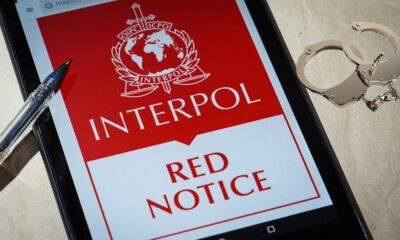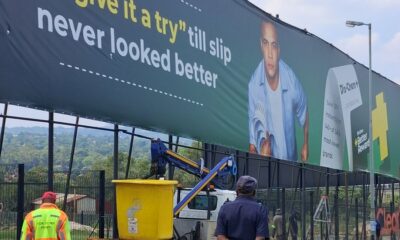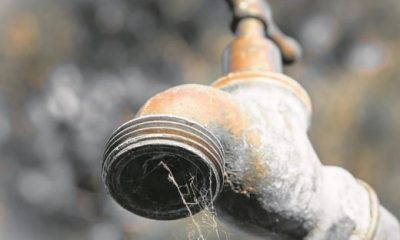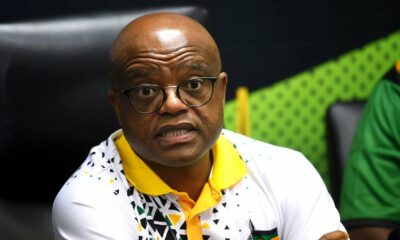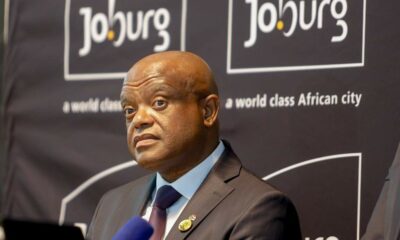News
Morero’s Water Rescue Plan: Johannesburg Cracks Down on Leaks, Illegal Use, and Inefficiency

Morero’s Water Rescue Plan: Johannesburg Cracks Down on Leaks, Illegal Use, and Inefficiency
Johannesburg Mayor Dada Morero says the city is finally confronting its water crisis head-on, with a plan that’s less about promises and more about action. After months of protests, dry taps, and mounting frustration, the City of Johannesburg (CoJ) has rolled out a comprehensive water turnaround strategy to restore reliability, accountability, and public confidence.
Fixing the Basics, Rebuilding Trust
At a recent media briefing, Morero laid out the city’s multi-pronged approach, from buying 20 additional water tankers to cutting off illegal water connections in informal settlements. The mayor said these disconnections, while controversial, are necessary to ease the strain on Johannesburg’s already stretched water system.
“This strategy is about getting the basics right, stabilising supply, strengthening governance, and restoring confidence in our city’s ability to deliver,” Morero said.
The CoJ’s new fleet of tankers aims to reduce costly contractor dependence, while ensuring that emergency water supply reaches communities faster and more efficiently.
Cracking Down on Corruption and Inefficiency
The turnaround plan comes in the wake of an internal investigation into allegations that some city employees accepted cash payments for water tanker deliveries, which are supposed to be free.
In response, Morero emphasised that governance reform is central to the new strategy. One of the biggest moves has been ring-fencing Johannesburg Water, turning it into a trading entity with its own financial accountability and performance oversight.
“This reform, supported by the Presidency and National Treasury, means we can manage water finances more efficiently,” Morero explained. “We’ve already seen improvements, meter readings are up from 91% in July to 92% in August, and we’re aiming for 95% by year-end.”
Tracking Every Drop: Smarter Water Management
To combat losses, Johannesburg has rolled out a series of high-tech solutions, from leak detection systems and smart pressure controllers to community awareness campaigns.
So far, the city has installed 225 noise loggers that detect leaks automatically, and 51 pressure controllers that reduce water wastage at night. These efforts have already helped cut daily water demand by 90 megalitres (ML) equivalent to nearly 36 Olympic-sized swimming pools.
Rebuilding a Failing System
While the technology helps, Morero acknowledges that infrastructure rehabilitation is the real battlefront. The city is currently repairing or upgrading critical reservoirs at Hursthill, Meadowlands, Dunkeld, and Aeroton, while major wastewater treatment plants, Olifantsvlei and Bushkoppies have completed significant upgrades.
Another, Goudkoppies, is nearing 95% completion. These projects, the mayor said, are vital to ensure water is stored, treated, and distributed more efficiently across Joburg’s vast network.
To meet future growth, new water towers and reservoirs are being built in Blue Hills, Limbro Park, and Bryanston. In the west, partnerships with Wits Enterprise have brought boreholes to four schools in Westbury and Coronationville, helping local communities cope with intermittent supply.
Community Partnership Is Key
Morero insists that no plan can succeed without community cooperation. “We still have challenges,” he admitted, “but we are confronting them with agency, transparency, and accountability.”
His remarks echo growing frustration from Joburg residents, many of whom have taken to social media demanding a long-term fix rather than temporary relief. Others, however, have praised the visible efforts, from borehole installations to leak repairs, calling it a “step in the right direction.”
A City Fighting for Its Flow
Johannesburg’s water crisis didn’t start overnight, years of underinvestment, population growth, and decaying infrastructure have brought the city to this point. But Morero’s plan signals a new chapter: one where accountability, technology, and collaboration could finally bring stability back to the city’s most essential service.
As the mayor put it, “We’re not just managing a crisis anymore, we’re rebuilding trust, one drop at a time.”
{Source: The Citizen}
Follow Joburg ETC on Facebook, Twitter , TikTok and Instagram
For more News in Johannesburg, visit joburgetc.com



